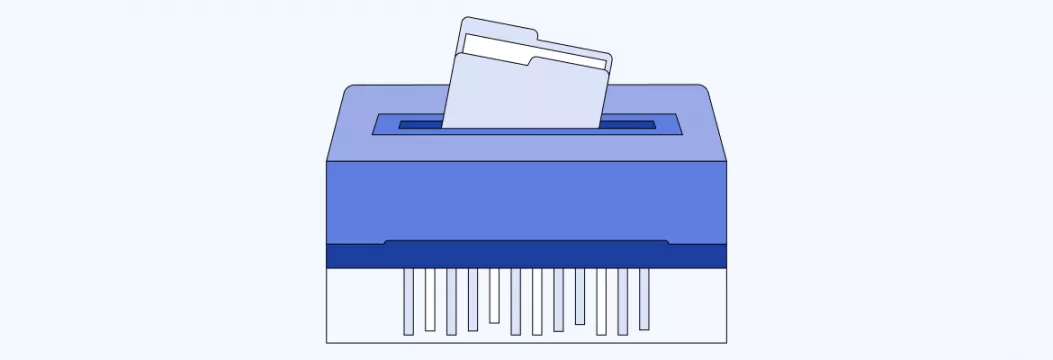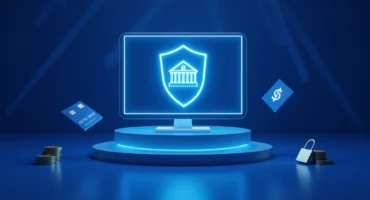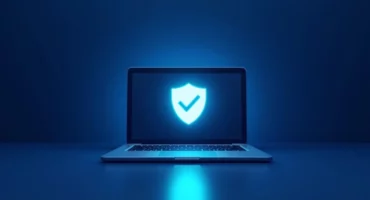VeePN Respects User Privacy: No Log VPN

Don’t want to leave cookies crumbs trail while online? It’s all about finding the right VPN with a strict No Logs policy — after all, it’s pretty hard for people to steal something if there is nothing to steal.
What does a No Logs Policy mean, anyway? And are zero logs at all possible in such a nosey place as the Internet? Read along to find out.
Why go for a No Log VPN?
Everyone wants their private communications to stay as such. So, many turn to a VPN to keep their browsing habits secret from their Internet Service Provider (ISP) and other snoops, like advertisers. The problem is that if you choose a VPN which keeps logs that can lead to a user, you are just shifting the problem from your ISP to the VPN provider.
Before going into what that means for your privacy, let’s tackle some terms first.
What is a log?
When you make a connection between two servers, a log is created — a record of events between two servers. Logs contain your IP address, the time you connected, and the duration of your connection. This info may seem innocent enough, but it can be worth a lot to marketers.
In the meantime, when visiting a web page, you reach out to the website’s server through the network of your ISP. And when using a VPN, you replace your ISP’s log with that of your VPN. Both the ISP (or a VPN) and website’s server make note of your connection in their logs. It doesn’t matter if you’re using your ISP’s server or your VPN’s — there is a log file somewhere. Besides, your system administrator (your ISP or boss, if you’re at work) can see your logs as well as the websites you visit.
Main types of Internet logs
Most VPNs claim they don’t keep connection and activity logs. So, what are those, exactly?
| Connection (network) logs | Activity (usage) logs |
|---|---|
| IP address | Websites visited |
| Connection date and duration | Files downloaded |
| Amount of data sent | Software used |
| VPN servers used |
- Сonnection logs keep a record of the connections the VPN server makes with websites.
- Usage logs show your online activity.
What is No Log VPN?
Now, how does (not) keeping those logs affect VPN users?
A VPN provider’s log-keeping policy shows their approach to data retention — that is, what user data they store. It sets the bar for what you can expect when using that VPN, and going for a No Log VPN is your best bet here. So, a No Log VPN is a VPN service that doesn’t collect (or log) data that passes through its servers.
There is a little catch, though — a VPN does need some user info to run its service. But it all comes down to whether this info is sensitive. For example, many VPN providers keep session logs, like session time and amount of data used. They don’t contain any browsing data nor your IP address. As a result, such logs aren’t something to worry about since they don’t lead to a specific user but help the provider analyze its service.
That said, let’s paraphrase a bit — a No Log VPN is a VPN service that doesn’t collect (or log) user sensitive data that passes through its servers.
How to choose a VPN without logs?
So many VPN providers claim to follow a No Logs policy, but then log everything you do. Not cool. What’s even less cool is that you won’t know if a VPN is being honest about this until it’s too late — until your personal data is out in the open, luring data thieves. So what should you do? Evidently, your best bet is to stick to a true no-log provider.
These are the most important features of top No Log VPNs:
- Privacy & VPN No Logs policy. VPNs can tell you lots of big words at first. But if you want to know how they really take their users’ privacy, go through the provider’s Privacy Policy and No Logs policy (if there is one).
- Laws and jurisdiction. True No Log VPNs work outside of jurisdictions of 5/9/14 eyes alliance countries, like the US, UK, Canada, and others — which can force services to hand over user data.
Note: 5 Eyes, 9 Eyes, and 14 Eyes are surveillance alliances made up of countries that agreed to share signals intelligence with each other. Any country within these alliances can ask for VPN records from companies headquartered in a member country.
- Features. Extra security features take it up a notch. For example, a VPN Kill Switch blocks your Internet access in case your VPN drops to avoid data leaks.
- Payment methods. Some VPNs have a crypto payment option, some don’t. If your payment is untraceable — your VPN provider is on the right track.
- Warrant canary. It’s not a new species of island bird, but a notice that a provider hasn’t been served with a government subpoena. This tiny statement reassures users that their data is safe.
Don’t miss out on VeePN when choosing a privacy-oriented VPN provider — it operates all of the above.
Why VeePN is a top service for privacy
VeePN doesn’t collect any of your sensitive data since it’s none of our business. You can browse the web, stream media, play games, or work in complete privacy. Here’s exactly how VeePN helps you maintain your privacy online:
- Strict No Logs policy. It clearly lays out what info we do store and why, for example, troubleshooting records to minimize the possibility of similar problems popping up in future. For more info, check out VeePN’s Privacy Policy which fits the definition of unintrusive.
- Outside the jurisdiction of 5/9/14 eyes countries. VeePN is based in privacy-friendly Panama, which has no data retention laws. So, governments can’t force the company to turn over any info.
- Cryptocurrency payment option. Keep your payments affordable and untraceable too by paying with crypto. Besides, you’re protected by VeePN’s 30-day money-back guarantee. So this is a risk-free investment.
- Special features for extra privacy. Benefit from an extra layer of security to guard highly sensitive information. Go for privacy-focused solutions like Double VPN (route your data through two VPN servers instead of one for double security) and a built-in VPN Kill Switch.
To recap, here’s what user info VeePN does and doesn’t store:
| What VeePN doesn’t collect | What VeePN collects |
|---|---|
| The information you downloaded and shared during your session | Account information |
| Your primary IP address and the IP given by our server | Website data |
| Your browsing history | Troubleshooting records |
| DNS queries | Service logs |
| Your device’s metadata | Payment history |
VeePN’s well-rounded apps provide all the functionality required in a VPN, while logging the minimum amount of data necessary and giving you peace of mind when browsing the web. Rest assured that your personal and browsing data remain hidden from the eyes of your ISP, the government, and VeePN itself. Nothing to store — nothing to share with anyone!
Bottom line
So, here is the deal:
- There is no VPN that keeps absolutely no information about its users.
- When we talk about No Log VPNs, we mean VPNs that log the minimum amount of data about you — the one required to run the service.
- The best privacy-oriented VPNs never keep any data that could lead to your online activity: no IP addresses, browsing activity, and so on.
Some thorough research can easily land you on a VPN provider that keeps zero logs and has your best interests in mind. VeePN is one such service you can trust to keep your browsing activity and private data as it should be — private. After all, the less a VPN knows about its users, the better.
FAQ
Is no-log VPN safe?
Yes, VPNs that follow a strict No Logs policy are good news for your privacy and safety online since they don’t store any sensitive information. VeePN is one such service that keeps your private info under wraps from the eyes of your ISP, the government, and VeePN itself. Learn more in this article.
Can the police track a VPN?
Police can’t track encrypted VPN traffic. However, if they have a court order, they can go to your ISP and demand connection or usage logs. Since your ISP knows you’re using a VPN, they can direct the police to them. Then, it all comes down to whether a VPN provider keeps user info and under which jurisdiction it operates. If the service follows a true No Logs policy, they basically can’t provide anything of value to the police.
VeePN is freedom




